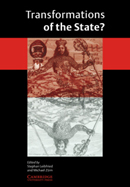|
 The influence of the state on the trajectory of human lives is more comprehensive and sustained than that of any other organizational construct.
It steers the economy, fights crime, provides education, regulates traffic, sustains democracy, enters wars, guarantees social welfare, builds streets, provides water, collects taxes, and deploys some forty percent of the gross national product.
The influence of the state on the trajectory of human lives is more comprehensive and sustained than that of any other organizational construct.
It steers the economy, fights crime, provides education, regulates traffic, sustains democracy, enters wars, guarantees social welfare, builds streets, provides water, collects taxes, and deploys some forty percent of the gross national product.
"Transformations of the State?" defines the multi-faceted modern state in four intersecting dimensions: resources, or control of the use of force and revenues; law, or jurisdiction and the courts; legitimacy, or the acceptance of political rule by the populace; and welfare, or the facilitation of economic growth and social equality.
The remarkable feature of the twentieth-century nation state was that it focused the activities of those four dimensions at the national level, merged them in one tightly woven fabric that was so plush and well-suited th the post-WWII era that people nowadays look back on the period as the golden age of the state.
- But what has become of that Golden-Age State and its national interweaving of functions in the decades since the seventies?
- Is its fabric worn out, is it unraveling? Will it be rewoven and restyled - perhaps as one gigantic world state of uniform pattern, or perhaps in the miniature, as a multitude of semi-sovereign regional governments?
- Or will be fibres simply separate, each following its individuell fate in postmodern fashion, the rule of law moving into the international arena and the nation state clinging to its resources, while the intervention state comes completely unspun and goes every which way?
- What is the future of the state?
In "Transformations of the State?" political scientists, lawyers, economists and sociologists take a sample of OECD nation-states, and search for answers to these questions.
Download
Table of Contents 
|
Leibfried, Stephan (Ed.)
Zürn, Michael (Ed.)
2005
Cambridge: Cambridge University Press
More information
Extern Link 
|